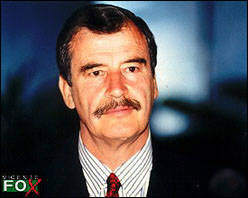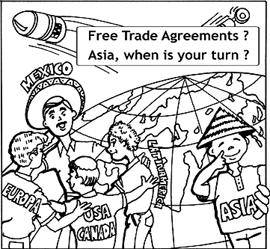 POLITICS: THE UPSET OF THE CENTURY POLITICS: THE UPSET OF THE CENTURY |
On July 2, thousands of Mexicans gathered around the Angel of Independence to celebrate the political upset of the century. For the first time in more than 71 years, the Institutional Revolutionary Party (PRI), which had been the longest ruling single-party government in the world, lost the presidency. Vicente Fox of the opposition National Action Party (PAN) shocked all of Mexico when he defeated favored PRI candidate Francisco Labastida by nearly 10 percentage points. Many people who hadn't even voted for Fox were cheering in the streets, if only because Mexico had finally exercised its democratic muscle and brought about what most Mexicans had been waiting for all their lives, but had never known: change.

"We knew that the people in Mexico were eager for a change," says President Vicente Fox. "As soon as I knew the results of the election, I felt a great honor to lead the aspiration of the people for a better Mexico."
Even the possibility of change might never have occurred without the efforts of former President Ernesto Zedillo. During his six-year administration, Zedillo, who has already secured his place in history as the man who brought democracy to Mexico, did much to open both the political and economic environment to competition. His achievements shine even brighter when one recognizes that he began his presidency during exceptionally difficult times.
His predecessor, the infamous Carlos Salinas de Gortari, left Zedillo, a former campaign manager with a Yale doctorate in economics, an enormous current-account deficit and an overvalued peso. Zedillo inherited a nation that, within days after his inauguration, would suffer its worst currency devaluation in history, and subsequently one of its toughest recessions. In 1995, Salinas promptly fled to Ireland, and the Mexican economy, as though caving in around the space Salinas once filled, contracted 6.2 percent.
Much to the experts and economists' surprise, Zedillo and his Cabinet, wielding a tight-fisted fiscal policy, were somehow able to hold the reigns and stay the course. Now, a half dozen years later, the Mexican economy is finally showing signs of recovery.
Inflation, the perennial scourge of the Mexican economy, is making slow, but steady progress toward the long-term goal of 3 percent, which would put Mexico on equal terms with the United States and Canada, its two largest trading partners. For the first time in decades, inflation came in last year below the government's 13 percent target. Taking into account the central bank's disciplined monetary policy and the fact the Zedillo administration has opted for a free-floating currency, inflation should continue to drop this year.
"My government will eliminate the inflation problem", confirms the new President Vicente Fox, "and finish the structural reforms to change the potential growth of the economy from 5% to a minimum of 7% sustainable rate of growth in the next 6 years."
Over the last five years, the economy will have grown annually at a rate of about 5.0 percent. Second-quarter Gross Domestic Product (GDP) growth came in at 7.6 percent, exceeding most analysts' expectations by far. Mexico has become the eighth-largest exporter in the world, and during Zedillo's tenure, total exports have increased by 150 percent.
This boom in export activity has spurred growth within the nation as well. In addition to the traditional and geopolitical center of Mexico City, investment and development have been making their way to other cities throughout the country. In the state of Jalisco, for example, Guadalajara has become a world leader in high-technology electronics manufacturing. And in the state of Nuevo Leon, Monterrey has been voted by several business magazines as the best city in all of Latin America to establish a company.
"What attracts people is education, job opportunities, services, and a quality of life in terms of housing, culture, and leisure," says Nuevo Leon Governor Fernando Canales Clariond. "All of these things can be found in Monterrey (to a degree) comparable with any large city in the world."
Enrique Mouret Benavides, president of Farmacias Benavides, a pharmaceutical company that has operated in Mexico since 1917, also sings Nuevo Leon's praises: "Clearly, creativity and the search for new solutions, new markets, and new ways of seeing things are the industrial and financial concepts used by (Nuevo Leon)."
In the face of his many achievements, many forget that Zedillo has also looked beyond Mexico and will leave Fox one of the most open economies in the world. Mexico has negotiated a several free-trade agreements, including a remarkable number of 28 countries, foremost among them the North American Free Trade Agreement (NAFTA), signed in 1994 with the United States and Canada.
NAFTA, no question Mexico's most successful trade agreement, has created a thriving regional market of more than 400 million people with a combined GDP of more than US$10 trillion. Contrary to the doom-and-gloom predictions of those who claimed that the northern neighbors would bully the emerging Mexican economy, the NAFTA has been a windfall for each member nation. Between 1993 (the year before NAFTA was ratified) and 1999, trade among the three countries has doubled from US$289 billion to US$570 billion. Mexico has overtaken Japan as the United States' second-largest trading partner and expects to overtake Canada for the number-one spot in less than 10 years.
Although the United States and Canada do command most of Mexico's free-trade attention, the Zedillo administration has hunted tirelessly for new trading partners. In little more than a decade, Mexico's economy has been transformed from one of the most protectionist to one of the most globalized in the world. In the last year alone, Mexico has signed free-trade agreements with Israel, not to mention the world's second-largest market, the European Union (EU). The EU agreement in particular will allow many areas of the Mexican economy-especially the agriculture sector-to diversify.

"I think we have come to a very good agreement
with Europe," says former Agriculture Secretary
Romarico
Arroyo. "(The agreement) is very complimentary
when one considers the availability of diverse raw
materials in Mexico with Europe's sophisticated
food-processing technology." |
Over the last eight years, Mexico has signed free-trade agreements with Chile (1992), Colombia and Venezuela (1995), Costa Rica (1995), Bolivia (1995), Nicaragua (1998), Uruguay (1999), and the Northern Triangle (1999), composed of Guatemala, Honduras, and El Salvador.
Not one to rest on its laurels, Mexico is currently in the process of strengthening ties with Asia. The Mexican Investment Board (MIB), for example, is currently collaborating on 19 manufacturing projects with Japan, four with Korea, two with Singapore, two with Australia, and one with Taiwan to attract more medium- and large-sized companies to Mexico.
"We want to balance our relations, both our investment relations and our trade relations," says the MIB's President Hermann Von Bertrab. "So Asia is very important to us, and we are trying to foster investment."
Mexico is currently negotiating an agreement with Singapore and negotiating a possible pact with Japan. What's more, there is talk of deepening ties with South Korea, which already has a considerable presence in Mexico with the likes of Daewoo Electronics, Samsung Electronics, LG Electronics, Hyundai, and others.
"It's very possible that (South) Korea will come to negotiate a free-trade agreement with Mexico," says Changshup Shim, general manager of the Korean Trade Center (Kotra). "We believe that Korean companies with technology to rival with Japan and the United States will provide the sophisticated technology that Mexico currently lacks."
Fox likewise has expressed his interest in fomenting trade with Asia.
"Mexico is an active member of APEC," says Fox. "We see in Asia an enormous number of possibilities."
The acceptance of globalization, the birth of democracy, and the dependability of a transparent, disciplined economic policy have combined to assure Fox of one of the most advantageous starting points in history for a Mexican president. Nevertheless, Fox would be the first to recognize that those blessings could very well be curses in disguise. Expectations, for one thing, are incredibly high. When one considers the veritable mountain of problems the Fox administration will face, one would expect those expectations to be largely unmet. To say that Fox has a rough road ahead of him might just be the understatement of the century.
First of all, his party does not enjoy a majority in either the House of Deputies or the Senate, a fact that may forestall Fox's ability to fulfill campaign promises. The stratospheric U.S. economy, which to a great degree determines the heights of the Mexican economy, is almost certain to lose altitude next year; Mexico's only hope is that the United States will land softly. There is also the monumental problem of poverty, the condition in which roughly 40 percent of the Mexican population lives, according to official estimates.

And despite the aperture of the economy in recent year to billions of dollars in direct foreign investment, Mexico's infrastructure is in great need of modernization.
"They will have to privatize the petrochemical industry, or they will shut it down," avows Hernan Gonzalez, senior vice president of Grupo Cydsa, a multifaceted company involved in chemicals, plastics, textiles, and environmental services, among other things. "Mexico does not have the money (or) the willingness to invest in that sector."
Despite the challenges he now faces, Fox has delighted domestic and international investors with his cowboy boots, his bucolic charm, and, above all, his oft-repeated pledge to run the country like a business. To put together his Cabinet, for example, the former president of Coca-Cola de Mexico contracted headhunters to track down the best and brightest minds in Mexico. He has also been very candid about his determination to push through much-needed fiscal and tax reform, reduce tax evasion by 20 percent, and double direct foreign investment from about US$11 billion to more than US$20 billion.
Fox has also been very open about his quest for sweeping tax reform. His economic advisor Luis Ernesto Derbez was quoted last September as saying that the Fox administration would finally put an end to "fiscal terrorism" by simplifying taxes and incorporating the informal economy-which some estimate to account for more than 40 percent of GDP. Furthermore, Fox says he plans to channel credits to micro- and small-sized companies to spur their development.
"We know that this sector has been forgotten by commercial banks", recognizes President Fox. "My government will create a program named Social Bank which final purpose will be to support all the small- and medium-sized companies with credit."
Fox's proposals not only address tax reform, but also run the gamut of Mexico's problems, covering everything from the obvious (fiscal and judicial reform), to the controversial (the aperture of the energy and petrochemical sectors to private investment), to the shocking (the elimination of the Commerce Secretariat - SECOFI).

That said, most of Fox's proposals have enjoyed the support of most organizations dedicated to promoting investment, perhaps foremost among them the Mexican Business Council (COMCE). COMCE Secretary Juan Manuel de Nigris Davila says his organization looks forward to working with the new administration "to continue perfecting the process of economic reform and modernization with integral fiscal, labor, and educational reforms."
Most agree that Mexico's economic future is bright. Zedillo's amazing track record and Fox's sanguine outlook have made both voters and investors more optimistic then ever about the future. In little less than a decade, Mexico has consolidated itself as not only one of the top economies in Latin America, but also one of the leading, most competitive emerging economies in the world. |

